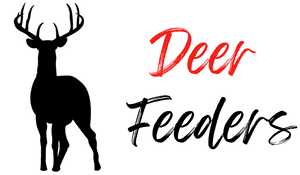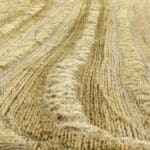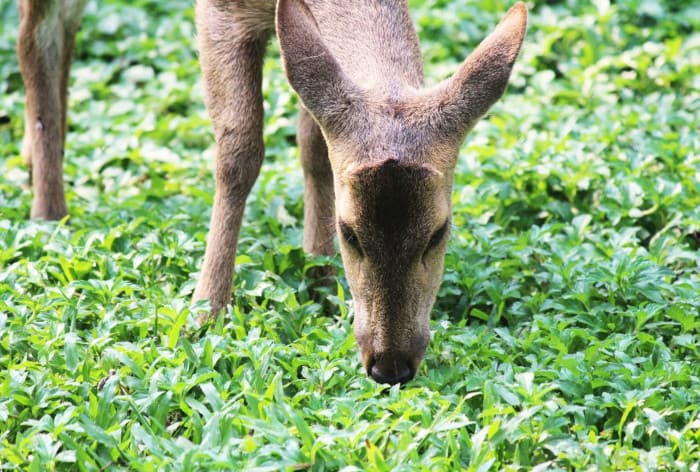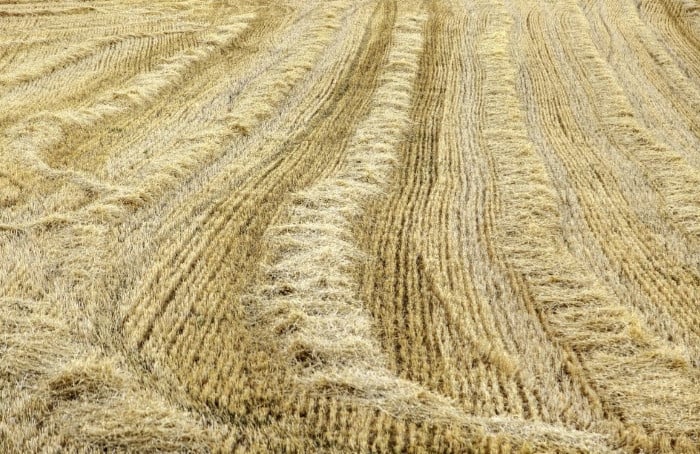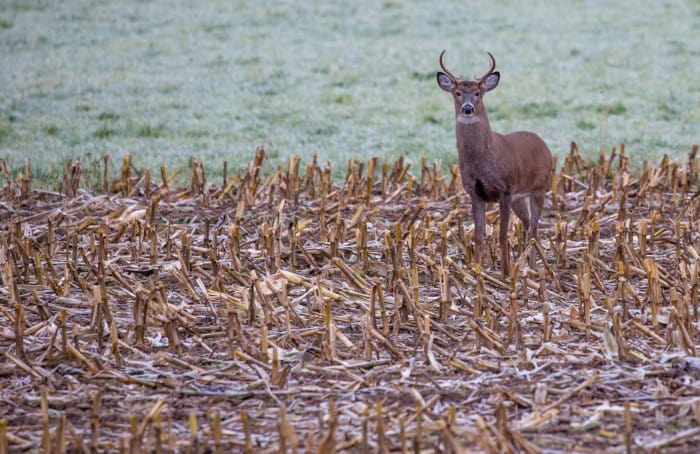Typically, at my day job, when people are asking about deer and peanuts, the questions are tied to one of three different scenarios:
- Animal aficionados that are interested in feeding their backyard deer with these groundnuts.
- Homeowners growing peanuts in a backyard garden and are trying to keep the deer out of those peanuts.
- From a hunter who is considering planting peanuts in a plot for deer hunting.
In this post, I’ll be focusing more on these groundnuts as a viable source of food versus how to keep the deer out of the peanuts in your garden. I’ll also try to cover each scenario and answer the following question: do deer eat peanuts?
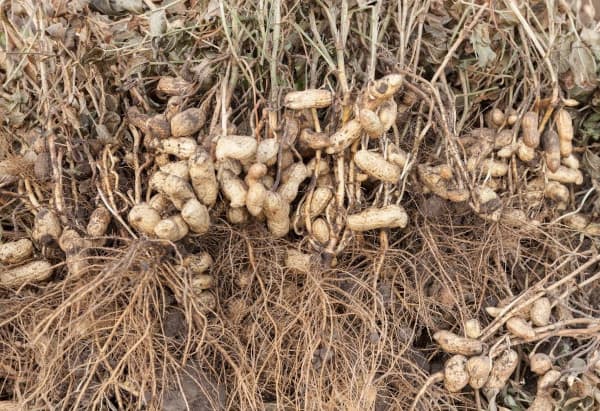
Will Deer Eat Peanuts?
Let’s answer the most pressing question first. Almost every species of deer can and will eat peanuts when these legume nuts are available. It may surprise you to know that earthnuts are part of the Legumes family, so, technically, they are classified as vegetables. It may also surprise you to learn that this species of nut is native to South America, and are known as groundnuts in that country. Some other common names for peanuts include: earthnut or goober.
Deer love peanuts and will consume peanuts in almost any format: raw, boiled, roasted, even peanut butter, etc. These legumes are grown underground, so whitetails will either dig up the plant to access the nuts or feed on the nut remnants after the nuts have been harvested.
Peanuts Are Not a Natural Food Source for Whitetail Deer
One important point to mention before getting too deep into the post is the fact that these nuts are not found in the wild and are not a normal part of a whitetail’s diet.
However, these legumes are grown commercially all across the United States, so it’s quite possible that deer can have access to the nuts from those commercially grown locations.
I say that to differentiate between natural deer food supply grown in the wild and man-made sources of food that are not available in the wild but become available through actions by humans.
Different Ways to Offer Peanuts as a Deer Food Source
There are several approaches you can take if you are interested in offering earthnuts to deer. Each method offers its own advantages and considerations. Here are some ways you can provide this tasty treat to your antlered friends:
- Raw Peanuts: Raw earthnuts straight from the shell are a natural option that closely resembles what deer would find in their natural habitat. These unprocessed nuts contain essential nutrients and oils that can benefit the overall health of the deer population.
- Roasted Peanuts: Roasting this species of nut enhances their flavor and aroma, making them more enticing to deer. The roasting process also removes excess moisture from the nuts, increasing their shelf life and reducing the risk of spoilage.
- Peanut Butter: Another alternative is offering peanut butter as a food item for deer. This highly palatable option provides a concentrated dose of energy-rich fats and proteins that can be beneficial during harsh winter months or when other sources of food are scarce.
Different Peanut Formats for Deer
In addition to feeding deer raw or roasted whole peanuts, it’s important to be aware of other available formats as well:
- Crushed: Crushing the whole nut into smaller pieces makes them easier for younger or older deer with dental issues to consume.
- Pelleted: Some manufacturers produce pelleted or processed peanut products specifically formulated for wildlife consumption. These pellets often contain additional nutrients and can be a convenient option for feeding deer.
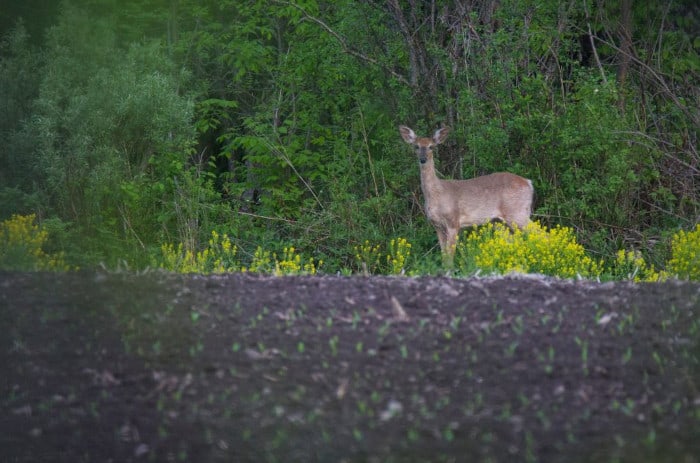
Raw Peanuts vs Roasted Peanuts for Whitetails
Both raw and roasted earthnuts have their advantages and disadvantages when it comes to feeding deer:
- Raw Peanuts: Raw versions of this nut are rich in natural oils, proteins, and carbohydrates, providing a great source of energy for deer. However, they have a shorter shelf life compared to their roasted counterpart due to their higher moisture content. That shorter shelf life makes them more potentially go bad faster than a roasted nut.
- Roasted Peanuts: Roasting peanuts enhances their flavor and aroma, making them more appealing to deer. Roasting removes excess moisture from the nuts, increasing their longevity. However, the roasting process may reduce some nutrient levels compared to raw nuts.
Benefits and Drawbacks of Feeding Peanuts to Deer
As with most things in life, feeding deer peanuts comes with some pros and cons. Let’s go over those good and point points:
Positive Points
Including peanuts in a deer’s diet can offer several benefits, including the following:
- Peanuts are rich in protein, which is essential for the growth and development of deer. This nutrient helps build strong muscles and promotes overall health.
- Peanuts contain healthy fats that provide an energy source for deer, especially during winter when food may be scarce. The high-fat content also aids in insulation against the cold weather.
- Moreover, peanuts are packed with essential minerals such as phosphorus, magnesium, and potassium. These minerals contribute to bone strength, proper muscle function, and overall vitality in deer.
By incorporating peanuts into their diet, you can help ensure that these majestic creatures receive the necessary nutrients to thrive.
Negative Points
While there are benefits to feeding peanuts to deer, it is important to consider the potential drawbacks as well. One major concern is the risk of aflatoxin contamination in peanuts. Aflatoxins are toxic substances produced by certain molds that can grow on improperly stored nuts. If consumed by deer in large quantities over time, these toxins can lead to serious health issues.
Another drawback is that excessive consumption of peanuts may cause digestive problems for deer. Peanuts have a high fiber content that can be difficult for some animals to digest properly. This could result in bloating or even gastrointestinal blockages if not monitored carefully.
Finally, offering peanuts as a food item may encourage dependency on human-provided nutrition rather than natural foraging habits. Deer should primarily rely on their natural environment for sustenance to maintain a balanced diet and develop crucial survival skills.
Weighing the pros and cons of incorporating this food item into a deer’s nutrition plan.
When considering whether or not to include peanuts in a deer’s nutrition plan, it is essential to weigh both the pros and cons. The high protein and fat content of peanuts can be beneficial, especially during harsh winters when sources of food are limited. However, the risk of aflatoxin contamination and potential digestive issues should not be overlooked.
To mitigate these risks, it is crucial to source high-quality peanuts from reputable suppliers who follow proper storage practices to minimize aflatoxin contamination. Peanuts should only be offered as a supplement rather than a primary food item to encourage deer to maintain their natural foraging habits.
Understanding how peanut consumption may impact a deer’s overall health and well-being.
Peanut consumption can have both positive and negative impacts on a deer’s overall health and well-being. When incorporated in moderation, peanuts can provide vital nutrients that contribute to muscle development, energy reserves, and bone strength. However, excessive or improper consumption may lead to digestive issues or dependency on human-provided nutrition.
To ensure optimal health, it is important to strike a balance between providing supplemental peanuts and allowing deer to rely on their natural foraging instincts. By doing so, we can help maintain the well-being of these magnificent creatures while enjoying the benefits that come with incorporating peanuts into their diet.
Planting Peanuts for Deer Food Plots
Planting peanuts as part of a supplemental feeding strategy can be an effective way to attract and nourish deer, creating optimal conditions for their growth while benefiting both hunters and wildlife enthusiasts. By cultivating peanut crops specifically for this purpose, we can enhance habitat quality for local wildlife populations.
The first step is selecting the right area. Peanut plants thrive in well-drained soil with plenty of sunlight. Whether you have a forested property or a small farm or garden, finding an open area with good exposure to sunlight is crucial for successful cultivation.
Once you have identified the ideal location, prepare the ground by removing any existing vegetation and tilling the soil. This will help create a favorable environment for the plants to take root and grow. It’s important to ensure that the soil pH is between 5.8 and 6.2, as peanuts prefer slightly acidic conditions.
Now it’s time to plant the peanut seeds. Make sure you choose high-quality seeds from a reputable source to maximize your chances of success. Plant the seeds about one inch deep into the prepared soil, spacing them approximately six inches apart. Consider using row planting techniques if you have a larger area available.
As the peanut plants start growing, it’s essential to provide them with proper care and maintenance. Regularly water your crop, especially during dry periods, ensuring that they receive at least one inch of water per week. Monitor weed growth and remove any unwanted vegetation that competes with the peanut plants for nutrients and space.
One of the benefits of planting peanuts as part of a plot strategy is their foliage serves as excellent cover for deer. The dense canopy created by mature peanut plants provides shelter while allowing deer to browse on tender leaves and stems within reach. This combination of cover and easily accessible food makes it an attractive choice for these animals.
In addition to providing cover and food, peanut plants also offer nutritional benefits to deer. Peanuts are rich in protein, which is essential for their growth and overall health. By incorporating peanut crops into your deer plot strategy, you can help supplement the natural diet of deer, ensuring they receive the necessary nutrients to thrive.
Furthermore, planting peanuts for deer plots can contribute to a healthier ecosystem. As deer graze on peanut foliage, they help manage vegetation and promote biodiversity within the habitat. This grazing behavior can prevent overgrowth of certain plant species and encourage the growth of other beneficial plants.
Deer’s Preference: Shelled or Unshelled Nuts?
Deer are known to have a diverse diet, consuming a variety of plants, fruits, and nuts. One common question that arises is whether deer prefer shelled or unshelled peanuts when offered as food.
There is no definitive answer as to whether they prefer shelled or unshelled nuts. However, there are certain observations and factors that can help us understand their preferences better.
One factor that may influence a deer’s preference is the ease of access to the nut’s contents. Shelling a peanut requires more effort than consuming one with its shell intact. Therefore, it could be assumed that deer might prefer shelled peanuts due to the convenience they offer. However, this assumption does not always hold true.
In some cases, deer have been observed eating peanuts with their shells still intact. This behavior suggests that while convenience may play a role in their choice, other factors come into play as well. For instance, during periods of scarcity when sources of food are limited, deer may be more inclined to consume any available food regardless of whether it is shelled or unshelled.
Another factor worth considering is the availability of alternative food supplies. If there are abundant natural food options like acorns or grass available to deer, they might show less interest in peanuts altogether. In such situations, their preference for either shelled or unshelled nuts becomes less relevant.
It is important to note that individual preferences among wild deer can also vary. Just like humans have different tastes and preferences, so do animals. Some deer might show a clear preference for one type over the other based on personal taste or previous experiences.
Nutritional Value of Peanuts for Deer
Peanuts are not only a popular snack for humans but can also provide significant nutritional benefits for deer. Let’s delve into the nutritional composition of peanuts and explore how they contribute to the health of these majestic creatures.
Analyzing the nutritional composition of peanuts reveals a rich profile that makes them an excellent food item for deer. Packed with essential nutrients, peanuts offer a balanced diet that supports the overall well-being of these animals. They contain high levels of protein, which is crucial for muscle development and repair in deer. Peanuts are abundant in healthy fats, providing a valuable energy source during harsh winter months when other food options may be scarce.
When compared to other natural food items commonly consumed by deer, such as acorns or grasses, peanuts stand out due to their superior nutritional value. While acorns are high in carbohydrates, they lack the protein content found in peanuts. Grasses, on the other hand, offer minimal protein and fat compared to this nutty delight.
The role of peanuts extends beyond mere nutrition; they play a vital role in providing necessary energy and sustenance for wild deer populations. During periods when bucks are growing antlers or does are nursing fawns, their bodies require additional nourishment. Peanuts serve as an ideal supplement during these critical stages by supplying the essential nutrients required for optimal growth and development.
Furthermore, peanuts offer versatility as a food supply since they can be easily incorporated into various feeding strategies employed by wildlife enthusiasts and hunters alike. Whether used in feeders or scattered across designated areas, these nuts attract deer due to their irresistible aroma and taste.
Considerations When Feeding Peanuts to Deer: Quantity and Timing
There are a few important considerations to keep in mind. It is crucial to understand the appropriate amount of peanuts that should be offered without causing harm or dependency on this particular source of food. Moderation is key when incorporating peanuts into a deer’s diet, and timing plays a significant role in ensuring their nutritional benefits.
Appropriate amount of peanuts
Feeding deer with peanuts can be a great way to supplement their diet, but it is vital not to overdo it. While deer can consume peanuts safely, excessive amounts can lead to health issues such as digestive problems or obesity. To avoid these complications, it’s best to offer them in moderation.
A good rule of thumb is to provide no more than one cup of peanuts per day for every adult deer. For fawns or younger individuals, half a cup should suffice. By sticking within these limits, you ensure that the deer receive the nutritional benefits without overwhelming their system.
Importance of moderation
Just like humans, deer benefit from a balanced diet that includes various food items. While peanuts are nutritious and high in protein and fats, they should not become the sole focus of a deer’s diet. Offering them as an occasional treat rather than a staple ensures that the animals continue receiving nutrients from other natural sources.
By practicing moderation and providing diversity in their diet, you prevent any potential negative consequences associated with an imbalanced intake of any single food item.
Significance of timing
Timing also plays a crucial role when offering peanuts as supplemental food for deer. It’s essential to consider the seasons and availability of natural resources while deciding when to introduce this treat into their diet.
During winter months when most sources of food may be scarce, providing some additional nourishment through peanuts can help sustain the animals until spring arrives. However, during abundant periods such as spring and summer when vegetation thrives, deer may not require supplementary feeding.
By aligning the timing of peanut consumption with the specific needs of the deer population, you ensure that they receive the maximum benefit from this additional source of food.
Potential risks
While peanuts can be a valuable addition to a deer’s diet when offered appropriately, there are potential risks associated with overfeeding or improper timing. Feeding deer excessive amounts of peanuts can lead to dependency on this human-provided food and discourage them from seeking out natural forage. This can disrupt their natural feeding behaviors and impact their overall health.
Moreover, offering peanuts during times when other food items are abundant may result in wasted resources or an unbalanced diet for the deer. It is crucial to strike a balance between providing supplemental nutrition and allowing them to rely on their natural instincts.
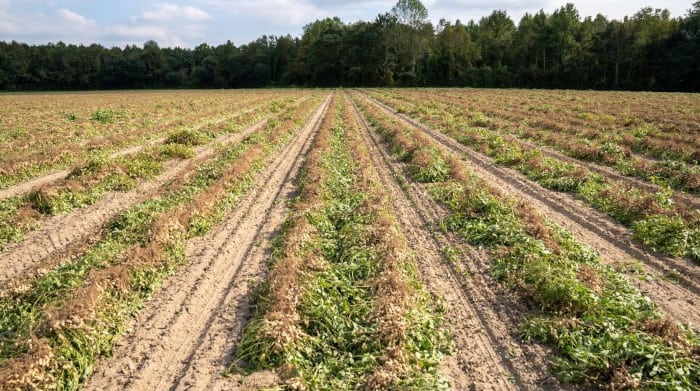
Final Thoughts
In conclusion, the relationship between deer and peanuts is an interesting one. Deer are known to consume peanuts, whether they are raw or roasted. However, there are both benefits and drawbacks to feeding peanuts to deer.
One benefit of feeding peanuts to deer is that they provide a good source of nutrition. Peanuts are rich in protein and fat, which can help deer maintain their energy levels during harsh winters or periods of low food availability. Planting peanuts as part of a food plot can attract deer and provide them with a supplemental food supply.
On the other hand, there are some drawbacks to consider when feeding peanuts to deer. One important consideration is the quantity and timing of peanut consumption. Feeding excessive amounts of peanuts can lead to digestive issues for deer, so it is crucial to provide them in moderation. Moreover, it’s important to avoid feeding peanuts during sensitive periods such as fawning season when the nutritional requirements of does differ.
Another factor to consider is whether deer prefer shelled or unshelled peanuts. While some studies suggest that shelled peanuts may be more appealing due to easier accessibility, others indicate that deer will consume both types.
Ultimately, understanding the nutritional value of peanuts for deer plays a vital role in making informed decisions about their diet. Peanuts offer essential nutrients that can support overall health and well-being in these animals.
To ensure the best outcomes when feeding peanuts to deer, it’s recommended to follow proper guidelines regarding quantity and timing. Consulting with wildlife experts or local authorities can provide valuable insights tailored specifically for your region.
In summary, while it is true that deer do eat peanuts and they offer nutritional benefits, it’s essential to exercise caution by considering factors such as quantity, timing, and preferences. By doing so, you can contribute positively towards supporting the well-being of these magnificent creatures.
FAQS
Can I feed raw peanuts directly to wild deer?
Yes, you can feed raw peanuts to wild deer. However, it is crucial to provide them in moderation and avoid excessive consumption.
Are roasted peanuts safe for deer to eat?
Roasted peanuts are generally safe for deer to consume. However, it is important to avoid adding any additional seasonings or additives that might be harmful. I suggest staying away from roasted nuts that use a spicy flavoring as well.
How do I plant peanuts as a plot for deer?
To plant peanuts as a feeding plot for deer, prepare the soil by removing weeds and tilling it. Plant peanut seeds approximately one inch deep and six inches apart. Ensure proper watering and maintenance throughout the growing season.
Do deer prefer shelled or unshelled peanuts?
Studies suggest that deer will consume both shelled and unshelled peanuts. Their preference may vary depending on accessibility and other factors.
What nutritional value do peanuts offer to deer?
Peanuts are high in protein and fat, providing essential nutrients that can support the overall health of deer.
Can feeding peanuts to deer attract them to my property?
Yes, planting peanuts as part of a food plot can attract deer to your property, providing them with a supplemental source of food.
What is the best way to feed peanuts to deer?
The best way to feed peanuts to deer is by placing them in a designated feeding area or using a deer feeder. This helps to concentrate the deer in a specific area and makes it easier for them to find the peanuts.
How do I prevent deer from eating my peanut plants?
To prevent deer from eating your peanut plants, you can use deer repellents or fencing. These methods create a barrier that deer cannot cross, keeping them away from your plants.
Are peanuts harmful to deer?
For the most part, peanuts are not harmful to deer. In fact, they are a great source of protein for the deer and can contribute to their overall health and antler growth. However, consuming an excessive amount of peanuts can potentially lead to digestive issues for whitetails.
Can I feed peanuts to deer all year round?
Technically, peanuts can be fed to deer throughout the year. However, it is recommended to provide them as supplemental feed during times when natural food items may be limited, such as in the early winter or when there is a scarcity of other food options.
Are there any other types of nuts that deer like to eat?
Deer also love other kinds of nuts, such as acorns, almonds, and soybeans. These can be offered along with peanuts to provide a varied diet for the deer.
Can deer eat salted peanuts?
It is best to avoid feeding salted peanuts to deer. The salt content in salted peanuts can be harmful to deer, so it is recommended to offer them unsalted peanuts instead.
Can I use peanut butter to attract deer?
As long as the practice is legal in your state, peanut butter can be used as a bait to attract deer. Smearing peanut butter on trees or using it in feeders can entice deer to come to the area.
